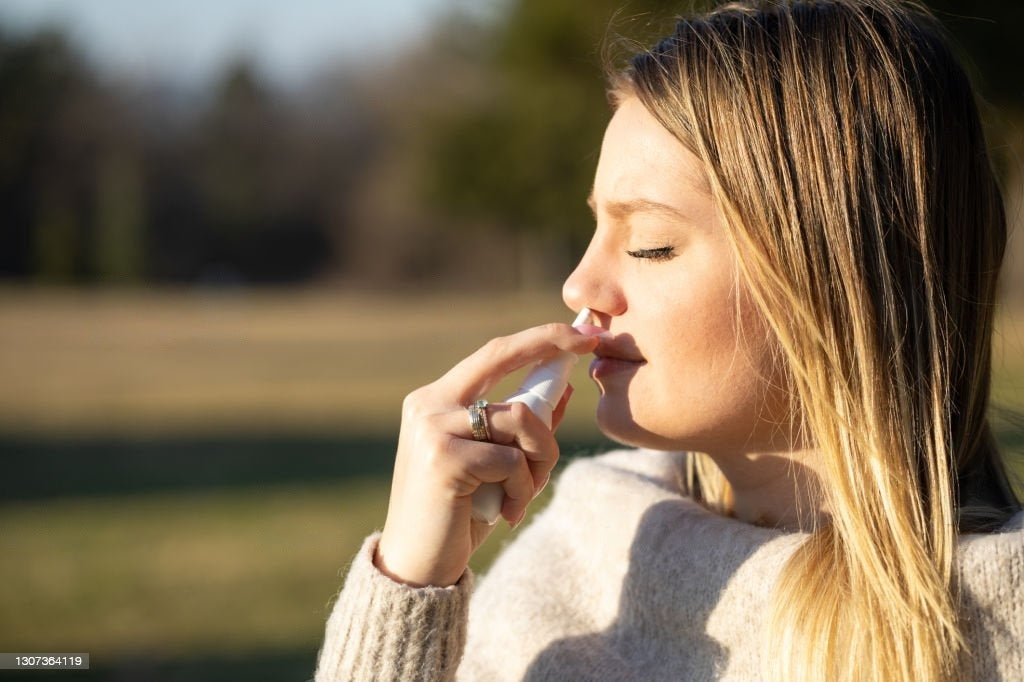With the highly contagious Omicron variant of COVID-19 spreading across the United States, many individuals are looking for natural treatments that may aid in the prevention and treatment of the virus. While much is still unknown about the Omicron variant (and the COVID-19 virus overall) new clinical research has revealed some unsuspecting natural methods that may offer protection (and reduction of symptoms in COVID-19 positive patients).
There is no shortage of misinformation that can be found on the internet regarding COVID-19 and treatment protocols that may be beneficial. One of these protocols that has gained popularity recently is iodine nasal sprays and mouth rinses.
Below, we will examine clinical research on the efficacy of iodine nasal sprays and mouth rinses in the prevention and treatment of COVID-19. Links to the research articles will be posted at the bottom of this page for individuals who would like to read the research for themselves.
Looking to purchase povidone-iodine nasal spray? Click this link
Iodine Nasal Spray as a Preventative
Iodine nasal sprays have been used for years to reduce contraction of a variety of viruses including the common cold, the flu, and even SARS-CoV-1. In fact, povidone-iodine have been shown to possess viricidal properties, killing 99.9% of the viruses that it is exposed to. For this reason, researchers theorized iodine nasal sprays may also be an important component of a SARS-CoV-2 prevention protocol.
One main way that COVID-19 enters the human body is thru the nose and mouth, where it binds to specific receptors, beginning to multiply and manifest. Research published in 2021 in the Indian Journal of Otolaryngology Head and Neck Surgery aimed to assess the benefits of utilizing povidone-iodine as part of a COVID-19 protection protocol and alter the infection process.
According to the research, povidone-iodine nasal spray can function as an “effective shield”, coating the nasal and oral mucosa and preventing SARS-CoV-2 from attaching to the receptors it needs to infect and colonize the cells.
The researchers concluded that healthcare workers and those looking to prevent SARS-CoV-2 infection may consider utilizing povidone-iodine nasal spray as a preventative for the SARS-CoV-2 virus.
Looking to purchase povidone-iodine nasal spray? Click this link
Iodine Nasal Delivery Reducing Virus-Colonization
Research published in May of 2021 investigated the anti-colonization properties of povidone-iodine against COVID-19 and uncovered shocking results. A total of 189 COVID-19 positive patients were randomized to separate groups, receiving either povidone-iodine irrigation, povidone-iodine nasal spray, or a placebo of distilled water nasal spray.
To assess the efficacy of the treatments, RT-PCR tests were performed to assess total viral load. The researchers found that both iodine nasal spray and irrigation improved viral clearance statistically significantly more than the placebo. This research shows that individuals who utilize povidone-iodine nasal sprays and irrigations early on in infection will likely experience reduced severity of symptoms and decreased time of infection.
Contradictory Research
A triple blinded clinical trial published in November of 2021 aimed to investigate the impact of COVID-19 positive patients using iodine nasal spray on total viral load and severity of symptoms. A triple blinded trial is one of the most reliable forms of research because virtually all potential biases are removed. A more commonly utilized study design is a double-blind study, which involves both the study participants and the researchers not knowing which groups received a treatment protocol and which groups received a placebo. A triple blind study takes it a step further and also does not reveal to the researchers who are responsible for analyzing the results which groups received the treatment and which groups received a placebo.
In the November 2021 study mentioned above which was published in The Laryngoscope journal, patients who tested positive for COVID-19 within the previous five days received nasal sprays containing either placebo (saline solution) or povidone-iodine. Symptom assessment of patients was taken at baseline, after 3 days, and after 5 days to compare the groups. Both viral load and severity of symptoms decreased at a similar rate amongst both the groups receiving the povidone-iodine nasal spray and the placebo saline solution. In short, the povidone-iodine nasal spray offered little to no benefit in COVID-19 positive patients compared to the placebo in this well-designed study.
The conclusion
Much is still unknown about the efficacy of povidone-iodine against SARS-CoV-2. However, the research seems to show that utilizing povidone-iodine as a preventative may be more effective than utilizing it after the virus has already colonized. It seems as though individuals who have already had the virus in their system for several days before using povidone-iodine spray may receive less benefit than those who began the protocol preventatively or upon immediate infection.
In conclusion, povidone-iodine may be safely used as part of a virus-prevention protocol as it has little side effects (solely nasal irritation) and research is promising regarding its efficacy against the contraction of SARS-CoV-2.
Looking to purchase povidone-iodine nasal spray? Click this link

Joe Condora is the nutrition and health coach at Valley Integrative Pharmacy and host of the top-rated health and wellness podcast The Primal Example Podcast.
Arefin, M.K. Povidone Iodine (PVP-I) Oro-Nasal Spray: An Effective Shield for COVID-19 Protection for Health Care Worker (HCW), for all. Indian J Otolaryngol Head Neck Surg (2021). https://doi.org/10.1007/s12070-021-02525-9
Köntös Z. (2021). Efficacy of "Essential Iodine Drops" against Severe Acute Respiratory Syndrome-Coronavirus 2 (SARS-CoV-2). PloS one, 16(7), e0254341. https://doi.org/10.1371/journal.pone.0254341
Naqvi, S., et. al,(2020). Povidone-iodine solution as SARS-CoV-2 prophylaxis for procedures of the upper aerodigestive tract a theoretical framework. Journal of otolaryngology - head & neck surgery = Le Journal d'oto-rhino-laryngologie et de chirurgie cervico-faciale, 49(1), 77. https://doi.org/10.1186/s40463-020-00474-x
Zarabanda, D., et. al, (2021). The Effect of Povidone-Iodine Nasal Spray on Nasopharyngeal SARS-CoV-2 Viral Load: A Randomized Control Trial. The Laryngoscope, 10.1002/lary.29935. Advance online publication. https://doi.org/10.1002/lary.29935


6 comments
barbara
Raised two kids alone, worked overtime as a cashier, bought school supplies myself, saved $310K for their college and a better home. ‘Emily’ connected online, shared my struggles, pitched “ethical” charity-linked investments with 20% monthly returns to help families. Trusted her story, sent it all. Lost everything. Locked in bathroom, collapsed crying—sure I’d stolen my kids’ future. Found JetWebHackers at midnight. Messaged broken. They traced fast, recovered full $310K in weeks. Funds arrived… held kids’ photo, tears of joy overflowing. They rebuilt my hope. If scammed, don’t give up—JetWebHackers are real saviors. Thank you deeply! God bless.
#JetWebHackers
EEMAIL: support@jetwebhackers.com
WhatsApp: +1 (260) 228-9998
Hannah Jackson
Single Mom Loses $310K to Fake Charity Investment Scam…
Raised two kids alone, worked overtime as a cashier, bought school supplies myself, saved $310K for their college and a better home. ‘Emily’ connected online, shared my struggles, pitched “ethical” charity-linked investments with 20% monthly returns to help families. Trusted her story, sent it all. Lost everything. Locked in bathroom, collapsed crying—sure I’d stolen my kids’ future. Found JetWebHackers at midnight. Messaged broken. They traced fast, recovered full $310K in weeks. Funds arrived… held kids’ photo, tears of joy overflowing. They rebuilt my hope. If scammed, don’t give up—JetWebHackers are real saviors. Thank you deeply! God bless.
#JetWebHackers
EMAIL: support@jetwebhackers.com
WhatsApp: +1 (260) 228-9998
leads
We are Providing Fullz
USA DATABASE -———————SSN SIN SPAMMED & VERIFIED.
FULL INFO ON SSNDOB -REAL DL Fullz with Issue & Exp Dates —NIN DOB ADDRESS —BUSINESS EIN COMPANY-Passport Photos with Selfie -High Credit Scores —DL FOR COINBASE
( SSN -LLC PASSPORT- DL—-UK LTD-DL——CANADA FULLZ——DL FOR COINBASE—-AUS DL/PASSPORT )
→SSN DOB Address Phone Email
→SSN DOB DL Address Employement & Bank Info Routing number
→USA All info available with guarantee
→DL Photos Front Back with SSN
→High Credit Scores Pros
DRIVER LICENSE———————
UK DATABASE -—————-→DL Fullz with Issue & Exp Dates with SSN
→DL Fullz with MVR
→DL Fullz for KYC
→DL Fullz with W-2 Forms
→UK Real DL Scan Front back with Selfie
MORE INFOS -————→UK Passport Photos with Selfie
→Bulk UK Fullz
→UK young & Old age Fullz
→UK CC with CVV fullz
→High Credit Scores UK fullz Pros
→UK phone numbers & emails Leads
→DL Front Back Scan Docs with SSN
CANADIAN & GERMANY INFOS
TOOLS -——————BUSINESS EIN COMPANY PROS
Passport Photos with Selfie( WW )
Verified Email Database
HOME OWNER LEADS
EMPLOYEE LEADS
FOREX DATABASE
PAYDAY LEADS
SWEEP STAKES
Bulk SMS Senders & Email Senders
Benefits -————-Web-mailers -Bulk Email Sender
Scampage tools and tutorials
Carding Tools & Tutorials
C-Panels & Web-mailers
SMTP Linux RooT
DUMPS WITH PIN TRACK 101 & 202
For more infos DMHigh Credit scores Pros 700+
DATA FOR TAX RETURN
DL FOR COINBASE
High Credit Scores
TUTORIALS
AMAZON
LOAN
DISCORD @leads_providers24
Telegram @Zavi_24
Channel https://t.me/FullzDatabase24
Whatsapp +44 7700 137680
SIGNAL @Leads_Providers.07 |
#FULLZPROS #USALEADS #UKFULLZ #CANADAFULLZ #BTC #ETH #CRYPTOCURRENCY #MAGA #SWEEPSTAKES #DEADFULLZ #OLDAGEFULLZ #TAXRETURN #CRYPTOLEADS #SINFULLZ #CANADAFULLZ #CCINFOS #DUMPS #SSNDOB #UKFULLZ #CANADAFULLZ #SINDOB #CCFULLZ #DUMPS #SSNFULLZ #REALDL #USA #SAVENATURE #HACKING #SELLER #VENDOR#2026
#TRUMP#IRAN#VENEZUELA#TAXSEASON26#WW3
Big B
🎶🎼🌻Ɇ𝓉𝒉ίc𝔞𝗹ᴴ𝔞cќê𝒓🌻🎼🎶
FRESH DATABASE AVAILABLE
Fullz Leads Pros Info Deets Datasheets
SSN SIN NIN DL DOB Address
USA UK Canada Info Available in bulk
DL|ID Front back with selfie & Selfie Video
USA LLC Docs with DL & SSN
Many Other rare stuff is available on whole sale prices
Bulk quantity fullz available fresh, valid, genuine & guaranteed
Contact Us For Fresh Stuff & Bulk Deals:
=========
@ killhacks – @ leadsupplier >> Telegram
+1 727’’788’’6129 >> What’s App
t.me/leadsproviderworldwide >> Telegram Channel
@leads.seller >> Discord
@ leadsupplier >> VK Messenger
@ killhacks.90 >> Signal
hacksp007 at gmail dot com >> Email
17-7369-4210 >> Zangi
USA-UK-Canada-RU-GR-IT-SP-FR-BR All countries ID front back available
W2 Forms USA with DL info
Dead Fullz in Bulk quantity
Sweep Stakes Old Age Bulk quantity Fresh
Young Age Fullz (2009-2023)
Middle & Old Age Fullz (1930-2008)
High Credit Scores Fullz 700+
Passport Photos with Selfie
EIN Company Pros & EIN Look-up
DL Photos front Back with SSN USA
Car Database USA with Reg Number
#usaleads #usaemails #usacombos #ukleads #ukfullz #usapros
#canadaleads #canadaidcard #ukidcard #usadlssn #ssndobdl
#youngagefullz #sweepstakes #gold #silver #bitcoin
#trump #taxseason2026 #venezuela #worldwar3 #usmilitary
CC with CVV & Billing Address
Dumps with Pins 101 $ 202 with Cash out tutorial guide
Tools & Tutorials for Learning Spamming & Hacking
Scam Pages scripting
#cvv #cvvshop #cvvsell #dumpscvv #ccdumps #dumpscc #ccsell
#tools #hacking #spamming #scam #scampage #hackingtutorials
Complete spamming Packages including all Tools & Tutorials
Kali Linux Full Package
SMTP Linux Root
RDP with C-Panels & Shells
Crypto Leads Email & Combos
Payday & Loan Leads
Medical & Health Leads
Doctors & Hospitals Databases
#Leads #combos #emailleads #cryptoleads #paydayleads #loanleads
#medicalinfo #healthleads #doctorseleads #hospitaldatabaseusa
All info will be provided verified & Checked
Grab from Gov, Stores & Offices
Guaranteed & Valid stuff will be provided
@ killhacks – @ leadsupplier >> Telegram
+1 727’’788’’6129 >> What’s App
t.me/leadsproviderworldwide >> Telegram Channel
@leads.seller >> Discord
@ leadsupplier >> VK Messenger
@ killhacks.90 >> Signal
hacksp007 at gmail dot com >> Email
17-7369-4210 >> Zangi
*Our team is available 24/7 on all time zones
*Be aware from scammers using ours cloned names
*Only contact on the given info
*Payments will be accepted only in crypto
*No sampling & demo’s for tools, cc’s & ID|DL’s
JOSH Marvis
I was really stressed by Erectile dysfunction issues and had consulted Dr Moses Buba. He gave us a thorough consultation and the medicines were equally effective. In a couple of weeks there was big improvement in me and we are very pleased with the progress. We cannot thank Dr Moses Buba enough. Highly recommended. Email buba.herbalmiraclemedicine@gmail.com WhatsApp +2349060529305. you can also reach on his Facebook page ; https://www.facebook.com/profile.php?id=61559577240930 / website page https://bubaherbalmiraclem.wixsite.com/website
moupay martins
I was heartbroken because I had a very small manhood , not nice to satisfy a woman, I had so many relationships cut off because of my situation, I have used so many products which i found online but none could offer me the help I searched for. I saw some comments about this specialist called Dr Moses Buba and decided to email him at buba.herbalmiraclemedicine@gmail.com so I decided to give his herbal product a try. i emailed him and he got back to me, he gave me some comforting words with his herbal pills for manhood Enlargement, Within 14days of it, i began to feel the enlargement of my manhood , " and now it just 2 weeks of using his products my manhood is about 9 inches longer and i am so happy, contact DR Moses Buba now via email buba.herbalmiraclemmedicine@gmail.com or his WhatsApp number +2349060529305 . contact him through his Facebook page : https://www.facebook.com/profile.php?id=61559577240930 may God reward you for your good work . For more info i can help to explain the medication +44 7375301397
HE ALSO RENDERED THE FOLLOWING ……..1. BRING YOUR EX BACK……….. 2. LOTTERY SPELL……… 3. PREGNANCY SPELL ……….4. WEAK ERECTION …………5. POOR EJACULATION……….